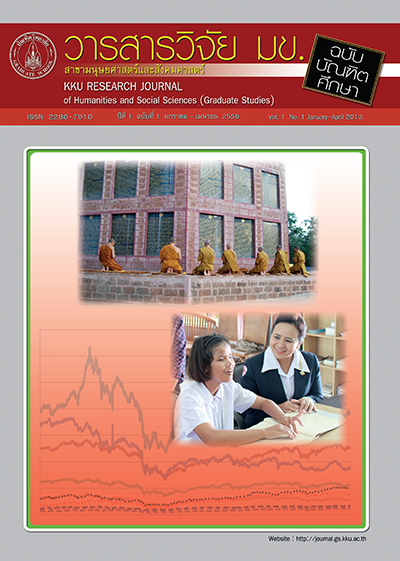Buddhad sa Bhikkhu’s Concept of Empty-Mind (Cit-Wang): Analytical Study(แนวคิดเรื่อง “จิตว่าง” ของพระพุทธทาสภิกขุ: ศึกษาวิเคราะห์)
Keywords:
Empty-mind (cit-wang)(จิตว่าง), Suññat(สุญญตา), Tipitaka(ศาสนาพุทธเถรวาท)Abstract
The objectives of this research are, firstly, to analyze Buddhad sa Bhikkhu’s view of empty-mind (cit-wang) in relation to the wider context of Therav da Buddhism. Secondly, this paper will then examine Buddhad sa Bhikkhu’s concept of “cit-wang” in connection to the idea of suññat in Therav da Buddhism. Lastly, this study will detail the view of other scholars with regard to “cit-wang” and examine the application of “cit-wang” to Thai society. Buddhad sa Bhikkhu coined the Thai term ‘cit-wang,’ or empty-mind as a modern application of the original Buddhist term ‘suññat ’ as found in the P li Canon. Nevertheless, there has been a great deal of controversy as to whether Buddhad sa Bhikkhu’s reinterpretation is in fact an accurate representation of the Buddha’s teachings. Many critics and scholars praised Buddhad sa Bhikkhu for his genius is bringing the obscure Buddhist term of suññat into the forefront of Buddhist practice, while others branded him a heretic who would herald the downfall of the Buddhist religion. This study has concluded that Buddhad sa Bhikkhu’s interpretation of “cit-wang” or “empty-mind” does in fact correspond to the concept of “suññat ” as found the original P li Canon, the most authoritative text in Therav da Buddhism. Both “cit-wang” and suññat cover the same concept of truth, namely, that all phenomena are empty of self or things related to the self. Moreover, since the concept of “cit-wang” is expressed through the more accessible medium of ‘Everyday Language’ (as opposed to ‘Dhamma Language’) it has succeeded in making Buddhist spiritual practice applicable in the everyday life of modern day people in Thai society.
การศึกษานี้มีวัตถุประสงค์วิเคราะห์แนวคิดเรื่อง “จิตว่าง” ในทรรศนะของพระพุทธทาส และในคัมภีร์ศาสนาพุทธเถรวาท และวิเคราะห์ “จิตว่าง” ของพระพุทธทาส และ “สุญญตา” ในคัมภีร์ศาสนาพุทธเถรวาท รวมทั้งศึกษามุมมองของนักวิชาการบนแนวคิดเรื่อง “จิตว่าง” และการประยุกต์ใช้ “จิตว่าง” ในสังคมไทย คำว่า“จิตว่าง” เป็นคำไทยใช้เฉพาะพระพุทธทาส ประยุกต์มาจากคำว่า “สุญญตา” ในคำสอนศาสนาพุทธดั้งเดิมที่พบในพระไตรปิฎก อย่างไรก็ตาม มีการถกเถียงกันมากว่า การตีความของพระพุทธทาสถูกต้องตามคำสอนของพระพุทธเจ้าหรือไม่ นักวิเคราะห์และนักวิชาการบางคนยกย่องพระพุทธทาสว่า เป็นผู้เฉลียวฉลาดสามารถนำ “สุญญตา” ซึ่งเป็นคำสอนลึกซึ้ง มาเป็นสิ่งที่ชาวพุทธสามารถปฏิบัติได้ ฝ่ายตรงกันข้ามวิจารณ์ว่า พระพุทธทาสเป็นพระภิกษุผู้ทำลายพระพุทธศาสนาให้เสื่อม การศึกษานี้สรุปว่า การตีความเรื่อง “จิตว่าง” ของพระพุทธทาส มีความสอดคล้องกับคำว่า “สุญญตา” ในพระไตรปิฎก ซึ่งเป็นตำรามีเชื่อถือได้ในศาสนาพุทธเถรวาท ทั้งคู่ของ “จิตว่าง” และ “สุญญตา” ครอบคลุมแนวคิดของความจริง คือ สภาวะทั้งหมดเป็นความว่างจากตัวตน และสิ่งที่เนื่องด้วยตน เนื่องจากแนวคิดเรื่อง “จิตว่าง” ใช้สื่อโดยภาษาคน (ตรงข้ามกับภาษาธรรม) ที่เข้าถึงได้ง่ายในการปฏิบัติทางด้านจิตใจของชาวพุทธ ซึ่งสามารถประยุกต์ใช้ในชีวิตประจำวันของคนสมัยใหม่ในสังคมไทยปัจจุบัน




